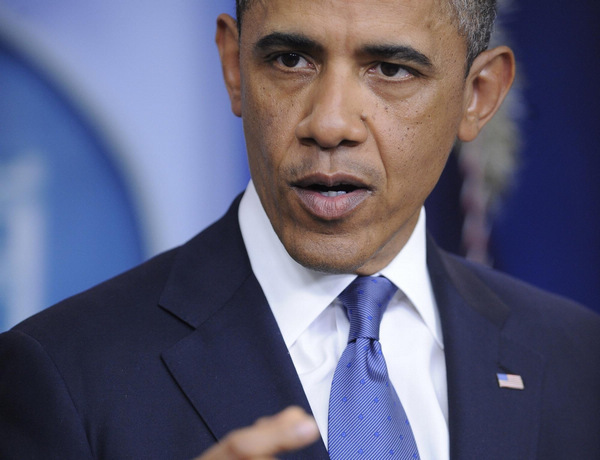Obama urges immediate action to resolve 'fiscal cliff'
Updated: 2012-12-29 09:40
(Xinhua)
|
|||||||||||
WASHINGTON - US President Barack Obama Friday called on US lawmakers to take "immediate action" to resolve the so-called "fiscal cliff."
Obama struck an optimistic tone at a press conference in the White House after an hour-long meeting, saying he had a "good and constructive" conversation with congressional leaders.
 |
|
US President Barack Obama delivers a statement on fiscal cliff negotiations at the White House in Washington Dec 28, 2012. Obama called Friday on US lawmakers to take "immediate actions" to resolve the so-called fiscal cliff, saying he had a "good and constructive" conversation with congressional leaders. [Photo/Xinhua] |
Obama hosted bipartisan leadership of the Congress, including Senate Majority Leader Harry Reid, Senate Minority Leader Mitch McConnell, House Speaker John Boehner and House Minority Leader Nancy Pelosi, the first time that Obama met these four congressional leaders to discuss the "fiscal cliff" since November.
Obama said he was "modestly optimistic" about a possible plan to avert the looming tax hike and government spending outlays cuts, adding that the dysfunction revealed by the negotiation deadlock has began to dampen business investment and consumption mood.
Senate leaders were working on a possible solution to the high-stakes "fiscal cliff." If they could not find a viable plan, he would ask for a vote on his own proposal, Obama told reporters.
Obama last week called on Congress to pass a pared-down deficit reduction plan of extending the current tax rates for all but the rich with annual income above 250,000 US dollars and extending the nation's unemployment benefits for 2 million people, following the failure of the grand bargain talk with Boehner.
Unless US Congress acts by the end of the year, a combination of tax increases and sweeping spending cuts totaling about 600 billion dollars will kick in, the effects of which could thrust the economy back into recession.
Related Stories
Obama, Congress huddle for talks as 'fiscal cliff' looms 2012-12-29 01:34
Reid urges GOP to act on 'fiscal cliff' 2012-12-28 11:17
US stocks opened mixed amid fiscal cliff concerns 2012-12-28 00:25
Obama to end holiday early as 'fiscal cliff'looms 2012-12-26 14:43
Obama, US Congress must strike deal to avoid 'fiscal cliff' 2012-12-24 10:51
US' fiscal cliff looms large over trade talks with China 2012-12-19 10:40
Today's Top News
President Xi confident in recovery from quake
H7N9 update: 104 cases, 21 deaths
Telecom workers restore links
Coal mine blast kills 18 in Jilin
Intl scholarship puts China on the map
More bird flu patients discharged
Gold loses sheen, but still a safe bet
US 'turns blind eye to human rights'
Hot Topics
Lunar probe , China growth forecasts, Emission rules get tougher, China seen through 'colored lens', International board,
Editor's Picks

|

|

|

|

|

|





